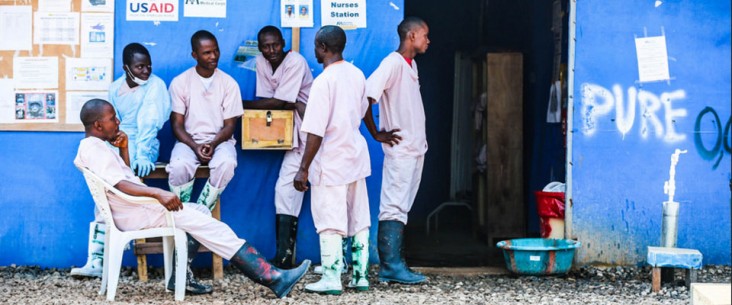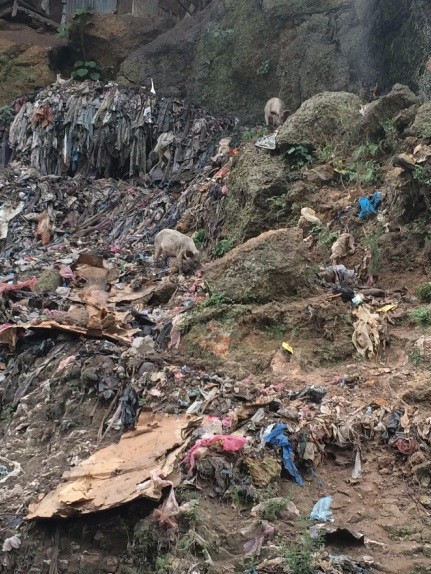
Infectious disease epidemics pose not only a local health threat but an international health security threat. National multi-sectoral cooperation is at the core of effectively combating infectious diseases through strengthened health care and preparedness.
Numbers at a Glance
15
2,500
32
Background
The 2013-2015 Ebola outbreak devastated lives and livelihoods in some of the most vulnerable countries in the world, infecting over 28,600 people in Guinea, Sierra Leone and Liberia, and killing over 11,300. The epidemic, which traces its origins to Guinea in December 2013, was the largest recorded Ebola outbreak in history.
The three Ebola-affected countries faced several challenges in addressing the epidemic early on, including resistance to Ebola control efforts in communities, the presence of Ebola in urban settings, inadequate treatment facilities, lack of knowledge and materials to perform even basic infection prevention and control, and insufficient numbers of health care workers in certain affected areas.
The Ebola outbreak shed light on the dearth of capacity required to prevent, detect, and respond to disease outbreaks of zoonotic origin in Liberia, Guinea, and Sierra Leone – and the urgency of building that capacity both in West Africa and elsewhere.
What We're Doing
Launched in February 2014, the Global Health Security Agenda (GHSA) is a global partnership, with central support from the U.S. Government, involving national governments, international organizations, and civil society groups focused on elevating global attention to the shared risks posed by emerging infectious diseases. GHSA seeks to accelerate measurable progress toward a world safe and secure from infectious disease threats through preventing, detecting, and rapidly responding to infectious disease outbreaks.
Through GHSA, USAID’s Emerging Pandemic Threats-2 (EPT-2) Program focuses on helping countries in West Africa and elsewhere, detect viruses with pandemic potential; improve laboratory capacity to support surveillance; respond in an appropriate and timely manner; strengthen national and local response capacities; and educate at-risk populations on how to prevent exposure to these dangerous pathogens. USAID’s programs in Avian Influenza and Emerging Pandemic Threats-2, in tandem with their Implementing Partners, are the main vehicles for meeting the goals and objectives of GHSA. USAID’s existing partnerships under the EPT-2program will take advantage of the experiences gained in East and Central Africa and Asia to implement activities to build health capabilities in West Africa.
In Liberia, Sierra Leone, and Guinea, the unprecedented spread of the Ebola virus among human populations across multiple countries in the region raises the possibility that the Ebola virus could have "spilled back" from people into previously unaffected animal populations. In order for host governments and the international community to prevent, detect, and respond to future outbreaks, they must understand the risk dynamics of the virus and other related factors such as seasonality, geographic distribution, and possible host reservoirs.
The USAID-supported Ebola Host Project is a comprehensive, multi-year effort to identify a range of animal hosts for Ebola viruses that could serve as a source of human infections, as well as the behaviors and conditions associated with increased likelihood of another outbreak in the three Ebola affected countries (Sierra Leone, Liberia, and Guinea). Through this initiative, the in-country capacities for surveillance and laboratory diagnostics will be strengthened. This will be critical to ensuring control of future outbreaks and serve as an excellent platform for GHSA activities, broadening countries’ capacity to prevent, detect, and respond to a range of emerging infectious diseases.

Results
USAID collaborated with host country governments and other partners in developing Liberia, Guinea, and Sierra Leone’s GHSA work plans, which are focused on building the countries’ ability to prevent, detect, and respond to emerging pandemic threats. These work plans are aligned with the respective governments’ health sector strategic plans. The progress and results include:
- GHSA activities are now being implemented in 17 Phase I and Phase II countries across Africa.
- Under the EPT program, USAID has trained over 2,500 government personnel, physicians, veterinarians, laboratory technicians, hunters, and students globally on biosafety, laboratory techniques, and disease outbreak investigation.
- Since 2009, USAID has equipped, supplied, and trained staff in 32 diagnostic laboratories around the world to safely and properly test wildlife samples for viral pathogens. This led to the sampling of more than 56,000 primates, bats, rodents, and other wild animals, and the detection and genetic sequencing of 820 novel viruses and 182 known viruses.







Comment
Make a general inquiry or suggest an improvement.